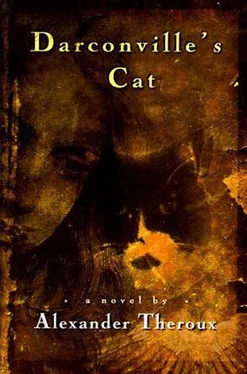It was mid-December now, with winterkill in the air. As on every Friday — the only day of the week he stopped working — Darconville set off through the cold-faced city to visit his grandmother’s grave. It was a habit he had formed from the first week of his arrival, initially with only the complication of money spent he couldn’t afford, later against a doctor’s orders. He faced away from the wind and hurried across a few blocks to the Fondamenta Nuove, paid the rampino, an old silent scaramouche there who, recognizing the black muffler and familiar black coat (threadbare now), unhooked the gondola from the steps, and they sloomed out in long lateral pushes toward the island-contained graveyard offshore, the Cimitero Communale.
The gravestone was a simple one, crowded into a shamble of sunken burial plots and old blackened tombs, many of them with skulls on the entablature and inscriptions relating to both plague and poison, open all to the melancholy requiem of wind and water. A spiked iron gatehouse, set in the circular wall, gave entrance. Darconville walked to the grave and, standing against the rapacious gusts of wind, tried to settle his thoughts around her memory. He tried to offer up a prayer, an attempt that became only a self-conscious reflection defeated by the hypocrisy he found in himself — in his failed love — which required forgetting to overcome and forgiving to absolve. I can’t forget, I can’t forget ! he thought. No! No! No! And what of forgiving, he thought bitterly, wasn’t circumscribed and so contravened by reinventing the imagination to acknowledge in art the questions life refused? He whispered to his grandmother but realized that the condition of our nature was such that we lived only to see those whom we love drop successively away, our circle of relation growing less until finally we are almost unconnected with the world. All union with the inhabitants of earth must in time be broken, he realized, and all hopes that terminate here must end in disappointment in spite of what by the desperate intercession of the heart we seek to keep.
The impossibility of being able to discover the results of prayer by any merely human test plagued Darconville. How, he wondered, could one determine when a true prayer was offered? If so much depends on the character and spirit of the suppliant, how could anyone who is unable to read the heart tell when the request which a seeker presents is such as God can approve? And how could any external observer take cognizance of such spiritual considerations as those which must enter into the determination of the questions whether, and in what form, a prayer has been answered? Where were the delicate instruments to measure the results in the suppliant produced, sometimes by the denial and sometimes by the granting of his requests? There were no answers given that didn’t force one to have to find them. And so he walked for hours into the darkening afternoon, the winter light disappearing abruptly as if the cover of the universe had suddenly banged shut, and he brooded over the questions interrogating him by the echo created in the void of his poor prayers.
The strong winds, snatching at his coat, almost took away his breath. He ducked into the chapel of San Michèle to get out of the weather, overcome as he entered by a severe tetany of coughing, strange in the silence, and he sat down in a pew and tried again to pray. His prayer became dreams, a slow wandering to an upper level of consciousness beyond the preteressential candlelight and scent of wax, and the dreams in their measurelessness showed him by way of his failed effort in what form a prayer might be answered: yes, he thought, I will make the ultimate confession! It must be the story of all lovers, with the ethical and aesthetic sense in the work leaving no means of reaching the truth uninvestigated. Not a simple reproduction of the sensible appearance of things but a representation of their inner reality, embodying and illustrating the truth by the laws of general validity! No, I shall write, thought Darconville — but to forget, and so by forgetting, forgive. It was almost as if he had never known what a certainty was until that night. Prayer, he realized, is utterance! The answer was in itself. Art creates the Eden where Adam and Eve eat the serpent.
Suddenly, Darconville was bending over, almost motionsick, with something fluttering in his chest, and, dizzy, his arms drawing in, he caught himself over a cramp, coughing violently from the lungs — and a spattering of black blood dropped onto the marble floor. It was the first sign of his indisposition, a second new truth to cope with but ignored, fatally, by the splendor of the one that came before.
The gondolier told him to hurry — it was late enough, he complained, to be asking double the fee — for the sea had grown choppy and a nightfog had blown in, ominously closing down over them. They rowed back to the city over the ebony swells, the bluish watery lights of Venice showing dimly through the vaporous night, and the clanking of invisible buoys, with their pitiful lack of resonance, sounded more lost and lonesome in the obscurity of the sea than ever could be imagined. The city from this approach had an aspect of death, as livid as a drowned person. Washed, undermined, and long worn by the lapping waters that rose each day with the powerful flow of the tide, working as a prisoner files his chains, the north side was being slowly eaten away. The façades of the palazzi, their rough coats faded and discolored by the salty air, were many of them blacked, the stucco astragals crumbling off them like sugar. The slick cobblestones under the lamplight shone and were strewn here and about with dead bits of calamaretti and scampi which had fallen from the boats, sails unfurled now, cordage stacked, all jerking in their moorings. The Merceria clock struck ten. It was late and the streets were nearly empty, except for a few old women wearing black shawls who hobbled through the shadows with bread and produce in net bags. There was the rattle of a descending shop shutter. A herring-gull screeched.
Darconville walked back over the narrow and acute streets and sudden bridges to the Corte del Gatto, a tired gallery of ancient chimneys and leaning walls: dwellings of different styles and epochs and states of preservation all jostled together but comfortable enough, he remembered, to have made him happy years ago. What had happened? Had he changed or had they? Now it was all an appalling, proliferating entrapment of hulks, with no interruption of line-building, haunted by class disability and poverty and fetid contamination, a phantom street of oppressive silence, a rioterra of dark mysterious doors that once opened straight upon the water but now crouched down behind the dwellings on the dockside of the more respectable Corte della Miseri-cordia, blind to them on the other side.
The grey palazzo — Darconville’s — stood at the very end, the sot-toportico, bolted by a door, once having led straight through to a walled courtyard at the back where now could be found only broken statuary, weeds, and several metal pergolas, rusting away. The voices of orphans out there, once raised in play, had long gone into the stone.
He let himself in, to a rush of dampness and Roman cement; the door, booming shut, echoed through three floors. He stood down in the antichiesetta, looking up. The walls were cold and thick and bare. The rooms were empty, long ago having been despoiled of their furniture and drapes and wall-fixtures, along with the beautiful desk on which, it seemed so long ago, he’d first begun to write. The lofty windows, half-covered with pieces of linoleum, could only be secured by renewing the cross-irons that had been pulled away, and the stone arches, with open fissures, had been clumsily buttressed by poor plastering. He took the flight of stairs, by cornices carved with flowers and broken walls open to brick facings, to the second-floor landing — where the rain had found its way between the arch-stones and was there arrested by the frost, operating like a wedge and dislocating the stones — and climbed to the upper floor. He quickly built a fire and cut up four lemons to add to the boiling water in the huge kettle hanging in the fireplace, an old massive chimney grate with half-dogs for wood or coal. By the feeble light of the fire, after drinking the weak toddy, he wrote until three in the morning, his inspiration dying with the last embers in the hearth. The manuscript had by now grown to more than three hundred pages, much of it taken directly from his notebooks, and what had already been done, a kind of commitment, gave him strength to do more, although this particular night’s work he couldn’t re-read for want of energy and a terrible ache in his diaphragm. He felt feverish, so drew a pile of blankets onto the bed of gamy old wood got at a priory, and slept.
Читать дальше












